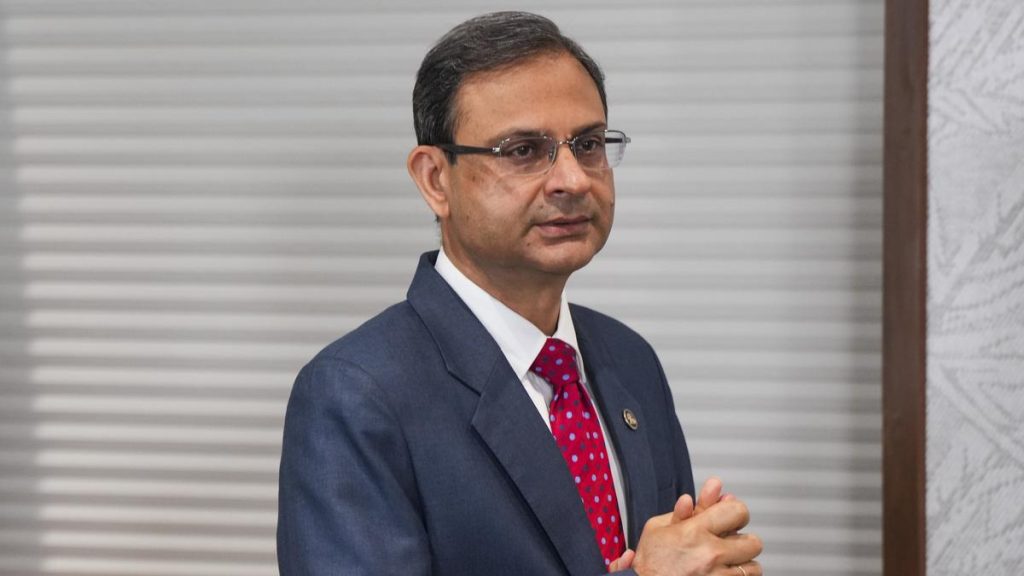
RBI Governor Sanjay Malhotra during a press conference after announcement of the first bi-monthly monetary policy of the current fiscal year, in Mumbai, on April 9, 2025.
| Photo Credit: PTI
Reserve Bank Governor Sanjay Malhotra on Wednesday (April 9, 2025) said that trade tariff related measures have clouded the economic outlook across regions, posing risk of new headwinds for global growth and inflation.
On the ramifications of a global tariff war on India, he said it shall have a negative impact on the country’s exports.
“Merchandise exports will be weighed down by global uncertainties, while services exports are expected to remain resilient. Headwinds from global trade disruptions continue to pose downward risks,” he said while unveiling the first bi-monthly monetary policy statement for the current financial year.
RBI has also lowered the growth projection to 6.5% from the earlier estimate of 6.7% for the current financial year due to global uncertainties.
“While the risks are evenly balanced around these baseline projections, uncertainties remain high in the wake of the recent spike in global volatility. It may be noted that the growth projection for the current year has been marked down by 20 basis points relative to our earlier assessment of 6.7% in the February policy,” he said.
This downward revision essentially reflects the impact of global trade and policy uncertainties, he said.
“The recent trade tariff-related measures have exacerbated uncertainties clouding the economic outlook across regions, posing new headwinds for global growth and inflation. Amidst this turbulence, the US dollar has weakened appreciably; bond yields have softened significantly; equity markets are correcting; and crude oil prices have fallen to their lowest in over three years,” he said.

Under these circumstances, Central banks are navigating cautiously, with signs of policy divergence across jurisdictions, reflecting their own domestic priorities, he said.
“There are, however, several known unknowns – the impact of relative tariffs, the elasticities of our export and import demand, and the policy measures adopted by the government, including the proposed Foreign Trade Agreement with the USA, to name a few. These make the quantification of the adverse impact difficult,” he said.
Last week, U.S. President Donald Trump announced the imposition of reciprocal tariffs on 60 countries, including India, effective April 9. India has attracted 26 per cent reciprocal tariff over various products, including shrimp, carpet, medical devices and gold jewellery.

The U.S. has claimed that American goods face 52% duty in the Indian market. A new tariff policy designed to reduce the U.S. trade deficit and boost domestic manufacturing.
From 2021-22 to 2023-24, the U.S. was India’s largest trading partner. The U.S. accounts for about 18% of India’s total goods exports, 6.22% in imports, and 10.73% in bilateral trade.
With America, India had a trade surplus (the difference between imports and exports) of $35.32 billion in goods in 2023-24. This was $27.7 billion in 2022-23, $32.85 billion in 2021-22, $22.73 billion in 2020-21, and $17.26 billion in 2019-20.
In 2024, India’s main exports to the U.S. included drug formulations and biologicals ($8.1 billion), telecom instruments ($6.5 billion), precious and semi-precious stones ($5.3 billion), petroleum products ($4.1 billion), gold and other precious metal jewellery ($3.2 billion), ready-made garments of cotton, including accessories ($2.8 billion), and products of iron and steel ($2.7 billion).
Imports included crude oil ($4.5 billion), petroleum products ($3.6 billion), coal, coke ($3.4 billion), cut and polished diamonds ($2.6 billion), electric machinery ($1.4 billion), aircraft, spacecraft and parts ($1.3 billion), and gold ($1.3 billion).
The 26% duty is over and above the existing duty being faced by Indian goods in the U.S.
Published – April 09, 2025 01:25 pm IST

